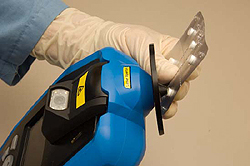TruScan 'not robust enough for substandard drug detection'
Phil Taylor, 21-Feb-2013
 ThermoFisher Scientific's TruScan device is increasingly used as a first-line screening defence against counterfeit medicines, but is not a reliable way to tackle the larger problem of substandard drugs, says a new study.
ThermoFisher Scientific's TruScan device is increasingly used as a first-line screening defence against counterfeit medicines, but is not a reliable way to tackle the larger problem of substandard drugs, says a new study.
In simple terms, substandard medicines are a category that includes genuine drug products which do not meet quality standards, likely because of poor manufacturing practices, while counterfeits are deliberately and fraudulently mislabelled with respect to their identity and/or source.
A study published in the Journal of Pharmaceutical and Biomedical Analysis (February edition) shows that the portable Raman spectroscopy device "could be used to detect some counterfeit medicines [but] could not be used to detect substandard medicines", according to the authors from the US Pharmacopeial Convention (USP).
The researchers - led by Mustapha Hajjou of the USP's Promoting the Quality of Medicines (PQM) programme - used samples of painkillers, antimalarials and diarrhoea treatments to evaluate how well TruScan could distinguish between similar pharmaceutical drug products with similar and/or different strengths.
On the basis of the tests, the USP researchers concluded that TruScan was "very likely" to detect counterfeit medicines that lack active pharmaceutical ingredient (API) or contained the wrong API.
However, because the technique failed to distinguish between different strengths of the same medicine, and its ability to test fixed-dose combinations is largely untested, it may not be adequate for detecting substandard finished pharmaceutical products, says USP.
In the case of fixed-dose combinations, where one API may have a strong Raman scatter, there are concerns this may mask the signal for other APIs.
The organisation therefore recommends that the use of the device should be limited to "initial screening for authentication of targeted medicines," with tried and tested techniques based on thin-layer chromatography - including the Global Pharma Health Fund's Minilab system - continuing to be a mainstay of first-line screening despite the need for specific training and use of reagents.



©
SecuringIndustry.com
 | back to top
| back to top




 ThermoFisher Scientific's TruScan device is increasingly used as a first-line screening defence against counterfeit medicines, but is not a reliable way to tackle the larger problem of substandard drugs, says a new study.
ThermoFisher Scientific's TruScan device is increasingly used as a first-line screening defence against counterfeit medicines, but is not a reliable way to tackle the larger problem of substandard drugs, says a new study.
